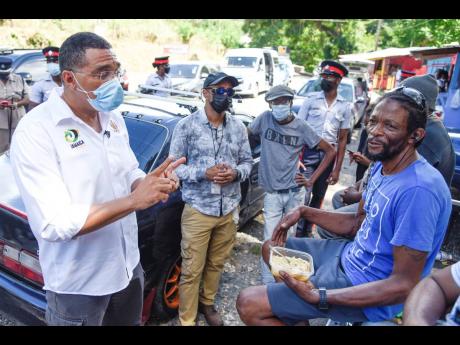PM defends employers’ right to vaccination policies
... says research on mandatory jabs still ongoing
Prime Minister (PM) Andrew Holness has hinted at support for businesses mandating COVID-19 vaccine for staff, declaring that companies have a right to protect their interests.
In fact, Holness, who was speaking during a COVID-19 vaccination tour in Richmond, St Mary, on Friday, said he has not seen anything in legislation which suggests that the move is illegal, though research is still taking place.
Last weekend, Labour Minister Karl Samuda told The Sunday Gleaner that there was no provision in law allowing for companies to force their employees to take COVID-19 vaccines.
A number of private sector businesses have, in recent weeks, implemented mandatory vaccination policies, requesting that employees present proof of vaccination or proof of negative COVID-19 tests weekly at workers’ expense, setting off a public firestorm with those against the jab at the forefront.
Only last week the National Commercial Bank became the latest private-sector group to implement a vaccination policy, triggering the launch of the ‘All are welcome’ campaign spearheaded by Jamaicans against the jab.
While no one has come forward as head of the movement, there is promise of a bloodless revolution in opposition to what is being called medical apartheid.
The movement has called for a boycott of businesses that have mandated the vaccine.
NEGOTIATE
“I think employees and employers have the right to sit with each other and negotiate. That’s the first strategy, but I think employers also have the right to protect their businesses and their investments,” said Holness.
The PM said that it is these businesses and investments that create employment and income.
Approximately 12.6 per cent of the population has been vaccinated.
“Now we have seen companies move ahead with vaccine mandates. We have seen nothing in the law to prevent them from doing that, but I’m not the legal expert and we are getting an opinion on that,” he said.
At the same time, Holness encouraged employers to go through a thorough process of engaging employees before mandating the vaccine, noting that he has seen companies achieve 100 per cent vaccination rates without a mandate.
RISKS FOR AN OUTBREAK
He said that for some businesses, however, it is evident that the risks for an outbreak are significant and, therefore, measures must be put in place to “incentivise and urge workers”.
The PM noted that globally countries have offered incentives for persons to take the vaccine, while transferring costs to those opposed to it.
“So if you are not vaccinated, then show us that you are not infected, and then the cost of proof is transferred to you by virtue of the exercise of your choice of not taking the vaccine. I think that is quite legitimate to protect the public good of the economy and returning our society to normality,” he said.
Holness told The Sunday Gleaner that his administration is moving deliberately and cautiously, as the possibility exists for litigation among those keen on testing the boundaries of the Constitution.
He said the Government is expecting legal challenges in the months ahead and is preparing itself.
“So, we have to make sure we order our steps and that they are correct. I think the greater disaster would be for there to be a negative ruling against the Government in this pandemic. So the Government has to be very careful to ensure that it is in keeping with what is understood to be the boundaries of the Constitution,” he said.

